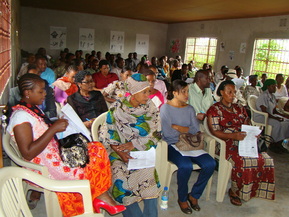
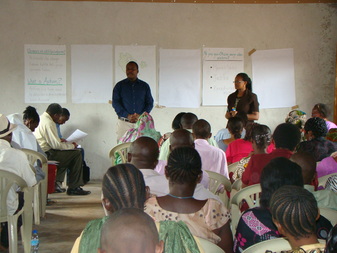
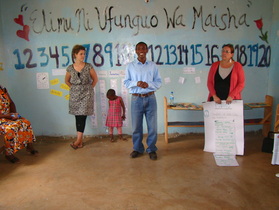
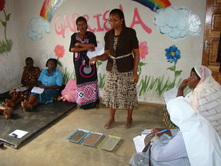
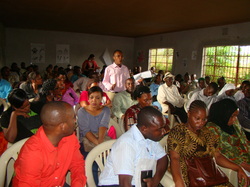
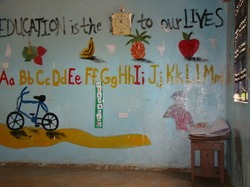
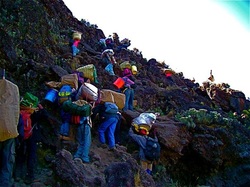
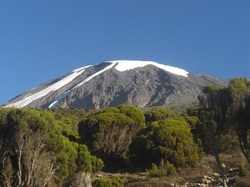
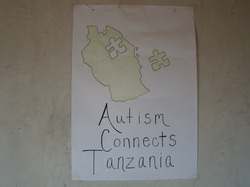
www.razoo.com/story/Stepping-Up-For-Special-Needs
Thanks for your support! Miss you all!
| Wazungu Wanderings |
|
One of our big goals this year while in Tanzania was to develop our Autism Connects Program. With the Kilimahewa Education Center finally running smoothly and the water project underway and fully funded we are now able to turn our attention to the Autism Project. To do that we have been networking with different organizations and helping to plan out our direction. This week we have been preparing for some upcoming trainings we have on intellectual disabilities. This past Saturday we hosted our first workshop and through our networking were able to empower 5 professionals to lead the workshop on intellectual disabilities. We had over 120 people in attendance from all parts of Tanzania and the group was made up of parents, teachers, therapists, childcare workers, and some children. It was a diverse group of people with very different levels of knowledge about autism and intellectual disabilities.  We started the conference by introducing everyone and discussing the causes of intellectual disabilities. We had a large spectrum of reasons people believed were the causes of intellectual disabilities. People suggested things such as drinking and smoking while pregnant to curses from witchdoctors and every cause was discussed. We had people talk about how they heard a child can get autism if their mother drinks too much water while she is giving birth or that if the parents want wealth more than children they will be cursed with autistic children. It was quite interesting to have so many people from different backgrounds in the same room because they were able to help each other address the myths that exist around the causes of intellectual disabilities. I am not sure if everyone was completely convinced in the end that witchdoctors and evil (these are long time cultural beliefs) are not the main causes of disabilities but it was an amazing discussion and everyone left with new perspectives.  After learning about the causes of intellectual disabilities and some of the basic characteristics we moved on to how these characteristics lead to a large stigma that impacts the lives of all who interact with special needs children. Parents talked about how other people in their villages treat them like they are dangerous or diseased. Parents talked about how schools won’t take their children and leave them with nowhere to go. Teachers talked about how they are not trying to stigmatize parents but that they do not have enough support in the schools to support severe disabilities in a classroom with 20-30 special needs kids and one teacher. Some parents and teachers were able to for the first time see each other’s point of view. One father talked about how he was scared to take his child out in public because he were worried people would harm or kill his son if he misbehaved. Teachers talked about how they are often also stigmatized as bad teachers because when school inspectors come to their classrooms students behave differently than other classrooms and often teachers are accused of not working hard enough to “fix” their students. While I listened to these stories I thought how some of the teachers and parents here in Tanzania were having very similar conversations that families and teachers in America were having but with a different level of support offered. We discussed how working with special needs children requires a very strong heart and desire to help and how this is not something that can always be taught and acknowledged that all the people in the room cared enough to learn more and where there for a reason. We continuously encouraged everyone to talk to each other and try to find solutions to problems through conversations with each other.  After discussing the stigma we had people share the ways they have fought against the stigma and the ways they have stepped up for their special needs children. A mother talked about how she held an emergency session of the community to inform them about her child because she had heard stories that the community was threatening to kill him because of his misbehaviors in town. Another father talked about how he took his child out of the country to the UK for help because he did not feel like people in Tanzania could help him. Two therapists talked about how they started an integrated early childhood program welcoming kids with and without special needs to try to teach families that others cannot catch disabilities. Another mother talked about how she made t-shirts for her son to wear that said “Don’t hurt me, I am autistic. Please call this number ….. if I need help.” A teacher talked about how she is working with her school to allow kids with intellectual disabilities to attend her vocational program and although she does not know how to help them she hopes it will give students a place to go when they finish primary school. It was pretty amazing for others to hear how they are stepping up against the stigma and trying to help these children be safe, be educated and have opportunities in life.  As Jillian and I continue to do work here we are really hoping to help some of the amazing program we have found. Next week we will be hosting a second workshop with an organization called Building Caring Communities. This organization has 11 centers around Moshi working with kids with intellectual disabilites. We will be working with them on developing teaching strategies that can be used in their centers and publishing a collection of resources to give to each center and other schools and centers in the area. Next month we then have another training with the Imani Vocational Center to talk about basic special needs teaching strategies that could be used in their vocational school. We are hoping our training series this past month helps create a new knowledge and empowers professionals working with these children to be leaders in fighting the stigma that exists around special needs in Tanzania.  This amazing experience this past weekend could not have been possible if it were not for our developing partnership with the Gabriella Center and the two young professional occupational therapists, Brenda and Anthony, who are working so hard to develop their programs to help kids with intellectual disabilities. Brenda and Anthony are working to help kids with intellectual disabilities by creating an integrated curriculum, having weekly therapy programs for children and parents, and having a long term intensive residential therapy programs. They are also working hard to fight the stigma by holding outreach programs within the community to educate about disabilities and have worked with a variety of organizations to start some of the earliest research on kids with disabilities in Tanzania. Their outreach program is working to unite different organizations to approach communities as a united front of many working to help families and fight the myths and stigma that exists here.  Other than our training series Jillian and I are looking to help support the Gabriella Center financially to fund a teacher, therapist and the outreach work they do and raise the funds to publish the special needs resource booklet we are working to create in our BCC training. We our hoping that through our support these groups can continue to the amazing work they do educating on myths and stigmas and empowering others to become activists to help these amazing children be safe, educated and have opportunities in life.  To raise the funds to do this Jillian and I will be climbing Mount Kilimanjaro in June and will be asking for support. It is our hope that we can help make a difference in the lives of kids with special needs by raising $15,000 through trekking the largest mountain in Africa and the largest free standing mountain in the world. We are hoping that the money we raise from this climb will help us help these amazing organizations.  Honestly, this climb scares the heck out of me and I am not sure if I will be able to make it to the top but I am willing to take the risk to fight against the strong stigma that exists here around people with disabilities. I believe that these kids are special and have so much life and spirit to offer the world and with additional support I truly believe that through empowering organizations here fighting the stigma these children will have a chance at a better life and their families will have more support and help.  We are looking for donations to help us as well as people willing to host fundraisers to help us collect donations. Please check out our Razoo Page for more information and help us Step for Special Needs!
www.razoo.com/story/Stepping-Up-For-Special-Needs Thanks for your support! Miss you all!
0 Comments
|